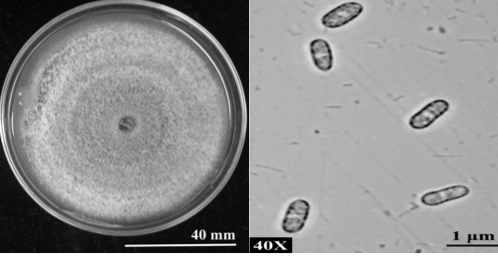 |
|
The disease reducing activity of eco-friendly chitosan compound against postharvest anthracnose caused by Colletotrichum gloeosporioideswas investigated by tests performed in in vitroand in vivoconditions. In this study, C. gloeosporioideswas isolated in pure culture from soursop (Annona muricata) tropical fruit, identified by morphological and molecular methods and then used in experimental tools. The inhibition of C. gloeosporioidesmycelial growth, sporulation and conidial germination by chitosan at different concentrations, 0, 0.1, 0.5, 1.0 and 1.5% was evaluated on potato dextrose agar. The application of 1.0 and 1.5% chitosan decreased mycelial growth and sporulation by 90%, and completely inhibited spore germination. The 1.0% of chitosan solutionshown the best performance on in vitrotest was monitored for 9 days in vivoon artificially inoculated soursop. Chitosan completely inhibited anthracnose and reduced weight loss of fruit. Quality parameters of fruit (pH, total soluble solids, firmness and titratable acidity) were not affected by chitosan application. Therefore, coatings with 1.0% chitosan could be recommended as on alternative treatment to the application of synthetic fungicides for keeping quality and controlling anthracnose of soursop during storage and shelf life.
Keywords: anthracnose, antimicrobial activity, colletotrichum gloeosporioides, resistance inducers, tropical fruit.
|
|
 |

